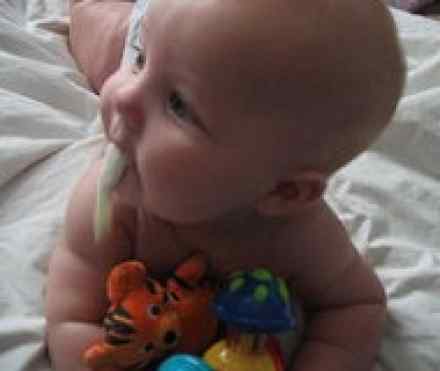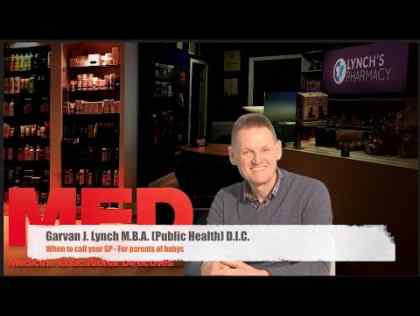
What is it?
- Gastro-oesophageal reflux is the non-forceful regurgitation of milk and other gastric contents into the oesophagus. It should be distinguished from vomiting which is an active process, requiring the forceful contraction of diaphragm and abdominal muscles. It occurs where there is incompetence of sphincter of the gastro-oesophageal junction or where raised intragastric or intra-abdominal pressures exist sufficient to overcome this mechanism.
- Physiological, asymptomatic reflux occurs in all adults and children but is infrequent (<5% of any 24-hour period, mostly occurring postprandially).
Risk factors for GORD
- Immaturity of lower oesophageal sphincter
- Chronic relaxation of lower oesophageal sphincter
- Increased abdominal pressure
- Gastric distension
- Hiatus hernia
- Oesophageal dysmotility
- Prematurity
- Cerebral palsy or other severe neuro developmental problems
- Congenital oesophageal anomalies
Presentation
Presenting symptoms include:
- Recurrent regurgitation or vomiting
- Epigastric and abdominal pain (often presenting as distress after feeds, behavioural problems, feeding difficulties and failure to thrive)
- Witnessed episode of choking or apparent life-threatening event
Complications of GORD include:
- Oesophagitis (with haematemesis, anaemia or stricture formation)
- Respiratory problems (e.g. cough, apnoea, recurrent wheeze, and aspiration pneumonia)
- Feeding and behavioural problems and failure to thrive.
Diagnosis
- In the majority of cases, this is made clinically, based on the history of effortless vomiting occurring after meals.
- Where the history is less clear or where symptoms are more severe, investigation may be required.
Prognosis
Most cases are benign with 55% resolved by 10 months and 80% resolved by 18 months. Not all infants require medications to control the symptoms. Surgery is required in a minority of patients.
- In patients whose reflux persists into later childhood, chronic cough, wheeze, clubbing, and recurrent pneumonias are a continuing theme.
- Growth and weight gain are adversely affected in two thirds of patients. Cerebral palsy, Down's syndrome, developmental delay, and Sandifer's syndrome are all associated with reflux. Two thirds of patients have delayed gastric emptying, and one third have aspiration pneumonia.
Treatments and drugs
Most cases of infant acid reflux clear up on their own. Treatment may include:
- Feeding technique changes. Smaller, more frequent feedings, interrupting feedings to burp, or holding your baby upright during and after feedings may be all that's needed to ease infant acid reflux. If you're breast-feeding, your baby's doctor may suggest that you eliminate dairy products or certain other foods from your diet. If you feed your baby formula, sometimes switching brands helps.
- Medication. If your baby is uncomfortable, your Doctor may prescribe infant doses of medications commonly used to treat heartburn in adults. Choices may include H-2 blockers, such as cimetidine or ranitidine (Zantac), or proton pump inhibitors, such as omeprazole or lansoprazole. It's important to note that otherwise healthy children taking these medications may face an increased risk of certain intestinal and respiratory infections. In addition, prolonged use of proton pump inhibitors has been linked to an increased risk of fractures of the hip, wrist and spine in adults.
- Alternative feeding methods. If your baby isn't growing well, higher calorie feedings or a feeding tube may be recommended.
- Surgery. Rarely, the muscle that relaxes to let food into the stomach (the lower esophageal sphincter) must be surgically tightened so that less acid is likely to flow back into the esophagus. The procedure, known as fundoplication, is usually reserved for the few babies who have reflux severe enough to interfere with breathing or prevent growth. Although surgery can reduce GORD symptoms, the complications are potentially serious — including persistent gagging during feedings.
Lifestyle remedies
Even with treatment, your baby will probably still experience reflux sometimes. To minimize reflux, consider these tips:
- Keep baby upright. Feed your baby in an upright position. Follow each feeding with 15 to 30 minutes in a sitting position. Try a front pack, backpack or infant seat. Gravity can help stomach contents stay where they belong. Be careful not to jostle or jiggle your baby while the food is settling.
- Try smaller, more frequent feedings. Feed your baby slightly less than usual if you're bottle-feeding or cut back a little on the amount of nursing time if you're breast-feeding.
- Take time to burp your baby. Frequent burps during and after each feeding can keep air from building up in your baby's stomach. To burp, sit your baby upright, supporting his or her head with your hand. Avoid burping your baby over your shoulder, which puts pressure on your baby's abdomen.
- Check the nipple. If you're using a bottle, make sure the hole in the nipple is the right size. If it's too large, the milk will flow too fast. If it's too small, your baby may get frustrated and gulp air. A nipple hole that's the right size will allow a few drops of milk to fall out when you hold the bottle upside down.
- Thicken the formula or breast milk. If your baby's doctor approves, add a small amount of rice cereal to your baby's formula or expressed breast milk. You may need to enlarge the hole in the nipple to make sure your baby can drink the thickened liquid.
Remember, infant acid reflux is usually little cause for concern. Just keep plenty of burp cloths handy as you ride it out.
References:
http://www.parenting.com/article/ask-dr-sears-coping-with-babys-acid-reflux
http://www.webmd.com/heartburn-gerd/reflux-infants-children
http://www.childrenshospital.org/views/august07/treating_acid_reflux_in_infants.html
http://www.usatoday.com/story/news/nation/2013/04/29/infants-reflux-gerd-ger/2113727/
http://www.babycenter.com/0_reflux-and-gerd_10900.bc
http://www.babble.com/baby/a-few-tips-on-how-i-survived-having-a-baby-with-acid-reflux/
http://digestive.niddk.nih.gov/ddiseases/pubs/gerdinfant/


